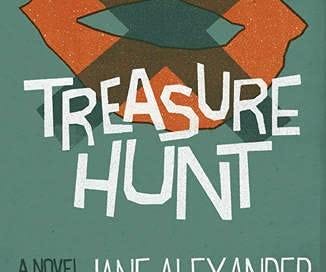A novel about a close-nit group of pals and cousins from rural Perthshire, the dynamics of their relationships and the inevitable civil war may seem at first glance very ‘debut Scottish novel’, but The Last Treasure Hunt quickly asserts itself as something special and unique.
Campbell Johnstone is thirty and going nowhere fast, stuck behind a Glasgow bar while his friends mature and move on. One of his childhood friends, Eve Sadler, is The Next Big Thing, a young, beautiful actress with a string of successful Hollywood supporting roles, back in Scotland to film her first lead alongside Morgan Freeman. When they were kids, Eve, a few years younger than the others, worshipped Campbell and followed him around. Campbell spent most of his time trying to ditch her, yet now, drawn by Eve’s newfound glamour and with afterimages of a particularly memorable sex scene in one of her early films, Campbell sneaks onto the set and tries to renew the friendship. Needless to say, it all goes wrong.
The Last Treasure Hunt is a modern morality tale. Campbell is quickly caught up in a world of paparazzi, showbiz agents and exclusive parties and he falls hard for the modern Faustian pact – fame in return for your soul. He moves to London, splashes money around like it has a use-by date and falls for his own hype. The more stories about Eve he sells, the more soap starlets he’s snapped with, the more his friends distance themselves from him. Aware that his fame is borrowed from Eve, he attempts to prove himself as talented in his own right with predictable car-crash results. The media know the script. The press giveth and the press taketh away: he is heading for a very public fall and when it comes, it’s front page news.
An early scene sets up the heart of the novel: Campbell is alone in his flat Googling pictures of Eve and reading ‘Starspotter’ sightings. There’s a disconnect. Eve on screen, Eve on Google; this is not the Eve he grew up with. She’s a celebrity. To us, celebrities aren’t real people. Later on, when he’s mulling a one-night stand with a fellow D-lister, delighted that it’s made the tabloids, we get the second part of the argument – to men, women aren’t real people. Throughout the book Campbell is casually, subconsciously misogynistic. Following those premises, his actions are totally justified. That is the world we live in.
This is why, perhaps more than the excellent analysis of the modern media and the control it has over those caught in its net, The Last Treasure Hunt is a timely book. In an age of internet trolls and online threats, a dialogue has begun about the experiences of famous women and the treatment women receive from men. Campbell is symbolic of both. He’s not evil, he’s just naïve and unthinkingly selfish. Alexander is too subtle to slap this message across the pages but it infuses every sentence, and structures the novel – if Campbell stopped for one moment and exercised an iota of empathy, he could avoid the impending crash. Of course, he never does. The Last Treasure Hunt is a masterclass in what happens when empathy is absent.
Alexander handles Campbell’s naïvety and self-delusion well. Writing from the point of view of someone lying to themselves is a tricky balancing act but one she deftly pulls off. By the time Campbell realises what the reader has known all along, it’s too late and he slinks home for the dramatic dénouement.





If the purpose of a review is to get someone to read a book, this has completely. Thanks, Iain.